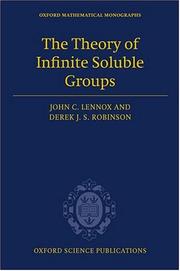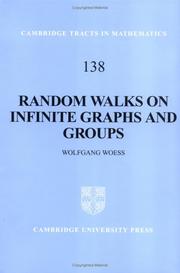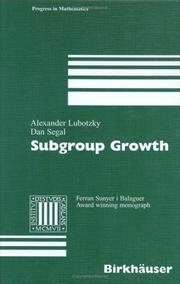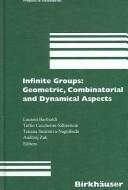| Listing 1 - 10 of 10 |
Sort by
|
Book
Year: 1970 Publisher: New York: Academic press,
Abstract | Keywords | Export | Availability | Bookmark
 Loading...
Loading...Choose an application
- Reference Manager
- EndNote
- RefWorks (Direct export to RefWorks)
Book
Year: 1954 Publisher: Ann arbor: University of Michigan press,
Abstract | Keywords | Export | Availability | Bookmark
 Loading...
Loading...Choose an application
- Reference Manager
- EndNote
- RefWorks (Direct export to RefWorks)
Book
ISBN: 9812793410 9789812793416 9812793402 9789812793409 Year: 2008 Publisher: Singapore Hackensack, NJ World Scientific
Abstract | Keywords | Export | Availability | Bookmark
 Loading...
Loading...Choose an application
- Reference Manager
- EndNote
- RefWorks (Direct export to RefWorks)
This book is a festschrift in honor of Professor Anthony Gaglione's sixtieth birthday. This volume presents an excellent mix of research and expository articles on various aspects of infinite group theory. The papers give a broad overview of present research in infinite group theory in general, and combinatorial group theory and non-Abelian group-based cryptography in particular. They also pinpoint the interactions between combinatorial group theory and mathematical logic, especially model theory.
Infinite groups. --- Representations of groups. --- Group representation (Mathematics) --- Groups, Representation theory of --- Group theory --- Groups, Infinite
Book

ISBN: 3110810387 9783110810387 Year: 2017 Publisher: Berlin Boston
Abstract | Keywords | Export | Availability | Bookmark
 Loading...
Loading...Choose an application
- Reference Manager
- EndNote
- RefWorks (Direct export to RefWorks)
Representations of groups. --- Infinite groups --- Groups, Infinite --- Group theory --- Group representation (Mathematics) --- Groups, Representation theory of

ISBN: 0198507283 9780198507284 Year: 2010 Publisher: Oxford: Clarendon,
Abstract | Keywords | Export | Availability | Bookmark
 Loading...
Loading...Choose an application
- Reference Manager
- EndNote
- RefWorks (Direct export to RefWorks)
512.54 --- 512.54 Groups. Group theory --- Groups. Group theory --- Infinite groups --- Solvable groups --- Soluble groups --- Group theory --- Groups, Infinite
Book
ISBN: 9780521719773 9780521895453 0521719771 0521895456 9781139167505 9780511424427 0511424426 0511423942 9780511423949 0511422792 9780511422799 1139167502 1107201527 1281791210 9786611791216 051142213X 0511423454 9781107201521 9781281791214 6611791213 9780511423451 Year: 2008 Publisher: Cambridge ; New York : Cambridge University Press,
Abstract | Keywords | Export | Availability | Bookmark
 Loading...
Loading...Choose an application
- Reference Manager
- EndNote
- RefWorks (Direct export to RefWorks)
Presenting groups in a formal, abstract algebraic manner is both useful and powerful, yet it avoids a fascinating geometric perspective on group theory - which is also useful and powerful, particularly in the study of infinite groups. This book presents the modern, geometric approach to group theory, in an accessible and engaging approach to the subject. Topics include group actions, the construction of Cayley graphs, and connections to formal language theory and geometry. Theorems are balanced by specific examples such as Baumslag-Solitar groups, the Lamplighter group and Thompson's group. Only exposure to undergraduate-level abstract algebra is presumed, and from that base the core techniques and theorems are developed and recent research is explored. Exercises and figures throughout the text encourage the development of geometric intuition. Ideal for advanced undergraduates looking to deepen their understanding of groups, this book will also be of interest to graduate students and researchers as a gentle introduction to geometric group theory.
Infinite groups --- Groupes infinis --- Infinite groups. --- 512.54 --- Groups. Group theory --- 512.54 Groups. Group theory --- Groups, Infinite --- Group theory --- Group theory. --- Groups, Theory of --- Substitutions (Mathematics) --- Algebra
Book
ISBN: 3031256328 303125631X Year: 2023 Publisher: Cham, Switzerland : Springer,
Abstract | Keywords | Export | Availability | Bookmark
 Loading...
Loading...Choose an application
- Reference Manager
- EndNote
- RefWorks (Direct export to RefWorks)

ISBN: 0521552923 9780521552929 9780511470967 9780521061728 Year: 2000 Volume: 138 Publisher: Cambridge: Cambridge university press,
Abstract | Keywords | Export | Availability | Bookmark
 Loading...
Loading...Choose an application
- Reference Manager
- EndNote
- RefWorks (Direct export to RefWorks)
Random walks (Mathematics) --- Graph theory --- Infinite groups --- Additive process (Probability theory) --- Random walk process (Mathematics) --- Walks, Random (Mathematics) --- Stochastic processes --- Groups, Infinite --- Group theory --- Graphs, Theory of --- Theory of graphs --- Combinatorial analysis --- Topology --- Extremal problems

ISBN: 0817669892 3764369892 9783764369897 3034898460 3034889658 Year: 2003 Volume: 212 Publisher: Basel: Birkhäuser,
Abstract | Keywords | Export | Availability | Bookmark
 Loading...
Loading...Choose an application
- Reference Manager
- EndNote
- RefWorks (Direct export to RefWorks)
Subgroup growth studies the distribution of subgroups of finite index in a group as a function of the index. In the last two decades this topic has developed into one of the most active areas of research in infinite group theory; this book is a systematic and comprehensive account of the substantial theory which has emerged. As well as determining the range of possible "growth types", for finitely generated groups in general and for groups in particular classes such as linear groups, a main focus of the book is on the tight connection between the subgroup growth of a group and its algebraic structure. For example the so-called PSG Theorem, proved in Chapter 5, characterizes the groups of polynomial subgroup growth as those which are virtually soluble of finite rank. A key element in the proof is the growth of congruence subgroups in arithmetic groups, a new kind of "non-commutative arithmetic", with applications to the study of lattices in Lie groups. Another kind of non-commutative arithmetic arises with the introduction of subgroup-counting zeta functions; these fascinating and mysterious zeta functions have remarkable applications both to the "arithmetic of subgroup growth" and to the classification of finite p-groups. A wide range of mathematical disciplines play a significant role in this work: as well as various aspects of infinite group theory, these include finite simple groups and permutation groups, profinite groups, arithmetic groups and strong approximation, algebraic and analytic number theory, probability, and p-adic model theory. Relevant aspects of such topics are explained in self-contained "windows", making the book accessible to a wide mathematical readership. The book concludes with over 60 challenging open problems that will stimulate further research in this rapidly growing subject.
Subgroup growth (Mathematics) --- Infinite groups. --- Croissance de sous-groupes (Mathématiques) --- Groupes infinis --- Infinite groups --- 512.54 --- Groups. Group theory --- 512.54 Groups. Group theory --- Croissance de sous-groupes (Mathématiques) --- Growth, Subgroup (Mathematics) --- Group theory --- Groups, Infinite --- Algebra. --- Group theory. --- Number theory. --- Science, Humanities and Social Sciences, multidisciplinary. --- Group Theory and Generalizations. --- Number Theory. --- Number study --- Numbers, Theory of --- Algebra --- Groups, Theory of --- Substitutions (Mathematics) --- Mathematics --- Mathematical analysis

ISBN: 1280608889 9786610608881 3764374470 3764374462 9783764374464 9783764374471 Year: 2005 Publisher: Basel ; Boston : Birkhauser,
Abstract | Keywords | Export | Availability | Bookmark
 Loading...
Loading...Choose an application
- Reference Manager
- EndNote
- RefWorks (Direct export to RefWorks)
This book offers a panorama of recent advances in the theory of infinite groups. It contains survey papers contributed by leading specialists in group theory and other areas of mathematics. Topics addressed in the book include amenable groups, Kaehler groups, automorphism groups of rooted trees, rigidity, C*-algebras, random walks on groups, pro-p groups, Burnside groups, parafree groups, and Fuchsian groups. The accent is put on strong connections between group theory and other areas of mathematics, such as dynamical systems, geometry, operator algebras, probability theory, and others. This interdisciplinary approach makes the book interesting to a large mathematical audience. Contributors: G. Baumslag A.V. Borovik T. Delzant W. Dicks E. Formanek R. Grigorchuk M. Gromov P. de la Harpe A. Lubotzky W. Lück A.G. Myasnikov C. Pache G. Pisier A. Shalev S. Sidki E. Zelmanov.
Infinite groups. --- Ergodic theory. --- Selfadjoint operators. --- Differential topology. --- Geometry, Differential --- Topology --- Operators, Selfadjoint --- Self-adjoint operators --- Linear operators --- Ergodic transformations --- Continuous groups --- Mathematical physics --- Measure theory --- Transformations (Mathematics) --- Groups, Infinite --- Group theory --- Group theory. --- Topological Groups. --- Combinatorics. --- Operator theory. --- Global differential geometry. --- Algebraic topology. --- Group Theory and Generalizations. --- Topological Groups, Lie Groups. --- Operator Theory. --- Differential Geometry. --- Algebraic Topology. --- Functional analysis --- Combinatorics --- Algebra --- Mathematical analysis --- Groups, Topological --- Groups, Theory of --- Substitutions (Mathematics) --- Topological groups. --- Lie groups. --- Differential geometry. --- Differential geometry --- Groups, Lie --- Lie algebras --- Symmetric spaces --- Topological groups
| Listing 1 - 10 of 10 |
Sort by
|

 Search
Search Feedback
Feedback About UniCat
About UniCat  Help
Help News
News